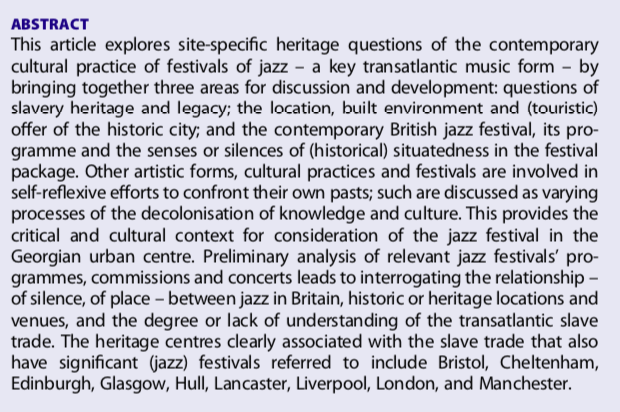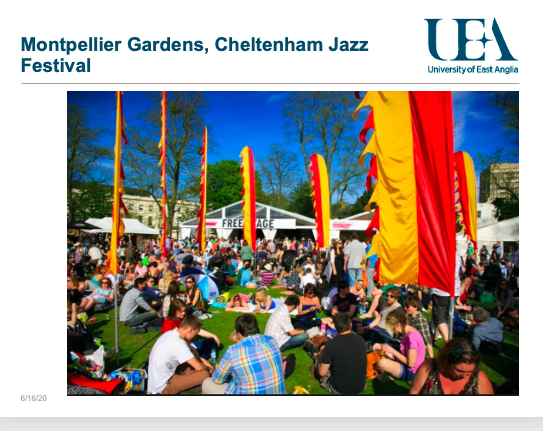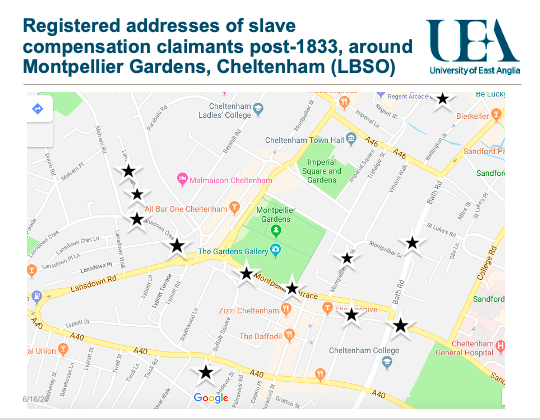As part of the EU-funded Cultural Heritage in Improvised Music Festivals in Europe (CHIME) project 2015-2017, one of my key activities was to write about questions of jazz festival, place, heritage. One piece was an article for a 2019 special issue on the project for the International Journal of Heritage Studies that I co-edited with Prof Tony Whyton.
Called ‘The heritage of slavery in British jazz festivals’, it looked at jazz festivals and tourism in civic centres historically associated with the transatlantic slave trade (TAST). Its relevance is stronger than ever. You can download the entire article here for free. Below is the abstract.

One example I explored was Cheltenham Jazz Festival, for two reasons. First, the current setting of the bulk of the festival is very clearly demarcated within one impressive key heritage space of the Georgian town. Second, it is not the typical slave trade port, such as a Liverpool, Bristol or Lancaster—so using it illustrates the wider reach and legacy of TAST-related activities across the UK in a non-maritime context.
The festival is held each year in a pleasing public square in Cheltenham, Montpellier Gardens, which is overlooked on three sides by elegant terraces of late Georgian-era townhouses and detached villas. The fourth has primarily shops and restaurants, mostly 18th and early 19th century too. With a big top, numerous marquees and tents, a free open-air stage, street food sellers and bars, flags and colourful temporary signage, and using the park’s own green credentials—its picnic lawn and mature trees—Montpellier Gardens is wonderfully transformed into a greenfield jazz site in the middle of a historic town. Music bleeds from one stage to the next, bounces off house fronts across the road, is softened by the trees in early leaf. All are welcome.


But we note also that the very space in which Cheltenham Jazz Festival takes place yearly—Montpellier Gardens—is profoundly implicated in historic transatlantic slavery: the ownership privilege and exclusive aesthetic appeal of the surrounding and nearby heritage buildings form the fabric and backdrop to the festival’s pleasures.
When and where in the context of the festival of the transatlantic music of jazz is the tense and problematic transatlantic history of Cheltenham highlighted, interrogated, if at all? These fine Georgian buildings, their transatlantic meanings, built with ‘slave-derived wealth’, should be too close for comfort, I feel, yet a kind of silence among all the music on offer is enduring. The festival is contained by its setting, by its setting’s history and origins, and jazz, that transatlantic music of identity, social justice (sometimes revolution), emancipation and irruptive celebration, is diminished at the very time—during its own festival—when it ought to be bursting with righteous life, energetic questioning, joyful or sombre criticality. Jazz becomes the sound of suppress. For Cheltenham, can we also say, read Bristol, Edinburgh, Glasgow, Lancaster and Other Jazz Festivals?
The conclusion to my article was rather gentle, I thought. (It took me a long time to write.) ‘…[A]mong the many recent and continuing cultural interventions around transatlantic slave trade heritage sites in Britain, other arts festivals now speak of the impossibility of disengagement from their locations. However, broadly speaking, the festival of jazz, despite the music’s own transatlantic formation, its Black Atlantic resonances, its liberatory claims around improvisation, its proud radical history, its innovative impulses, remains … behind the beat. That is surprising.’
